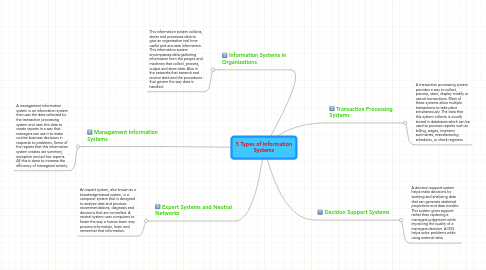5 Types of Information Systems
by Kevin Cress

1. Management Information Systems
1.1. A management information system is an information system that uses the data collected by the transaction processing system and uses this data to create reports in a way that managers can use it to make routine business decisions in response to problems. Some of the reports that this information system creates are summary, exception and ad hoc reports. All this is done to increase the efficiency of managerial activity.
2. Expert Systems and Neutral Networks
2.1. An expert system, also known as a knowledge-based system, is a computer system that is designed to analyze data and produce recommendations, diagnosis and decisions that are controlled. A neutral system uses computers to foster the way a human brain may process information, learn and remember that information.
3. Information Systems in Organizations
3.1. This information system collects, stores and processes data to give an organization real time useful and accurate information. This information system encompasses data gathering information from the people and machines that collect, process, output and store data. Also in the networks that transmit and receive data and the procedures that govern the way data is handled.
4. Transaction Processing Systems
4.1. A transaction processing system provides a way to collect, process, store, display modify or cancel transactions. Most of these systems allow multiple transactions to take place simultaneously. The data that this system collects is usually stored in databases which can be used to produce reports such as billing, wages, inventory summaries, manufacturing schedules, or check registers.
5. Decision Support Systems
5.1. A decision support system helps make decisions by working and analyzing data that can generate statistical projections and data models. This system gives support rather than replacing a managers judgement while improving the quality of a managers decision. A DSS helps solve problems while using external data.


